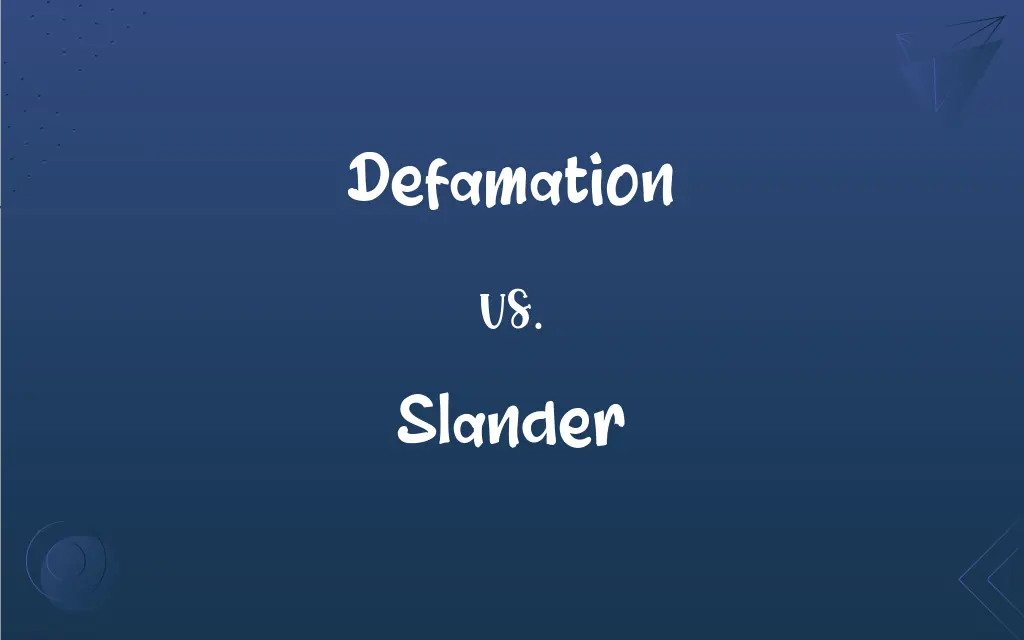Defamation vs. Slander: What's the Difference?
Defamation is harming another's reputation with false statements, while Slander is defamation specifically through spoken words.

Key Differences
Defamation encompasses any false statement, whether spoken or written, that injures a person's reputation. Slander, specifically, pertains to those defamatory statements that are spoken or uttered.
. Defamation serves as an umbrella term that includes various mediums through which false and damaging information can be disseminated about a person. Slander is one such subset, focusing solely on the oral form of misinformation.
. To claim damages for Defamation, one must generally prove that the statement was false, damaging, and made without adequate research into its truthfulness. When claiming damages for Slander, these criteria still apply, but it must also be evident that the statement was spoken.
. In the legal realm, differentiating between Defamation and Slander can be critical, especially when determining the nature and extent of damages. While Defamation can encompass damages from written (libel) or spoken statements, Slander deals exclusively with oral remarks.
. Both Defamation and Slander concern the protection of an individual's reputation against falsehoods. However, the primary distinction lies in the medium: Defamation is broad and medium-neutral, whereas Slander is medium-specific.
ADVERTISEMENT
Comparison Chart
Definition
A false statement damaging a person's reputation
Defamation specifically through speech
Medium
Can be oral, written, or other mediums
Exclusively oral
Legal Classification
Umbrella term
Subset of defamation
Proof Requirement
Falsehood, damaging nature, and carelessness
Same as defamation plus oral nature
Associated Term
Includes libel (written defamation)
Exclusive to spoken defamation
ADVERTISEMENT
Defamation and Slander Definitions
Defamation
The act of harming the good name of someone.
The false accusations amounted to Defamation.
Slander
Oral defamation harming a person's reputation.
The rumors he spread were pure Slander.
Defamation
Maligning a person's image with untruths.
He sued the newspaper for Defamation after they published the erroneous report.
Slander
Damaging someone's reputation through spoken untruths.
During the debate, he was careful to avoid Slander while critiquing his opponent.
Defamation
The dissemination of false claims about someone, leading to reputation damage.
The politician faced Defamation from opposing parties during the election.
Slander
Spoken words that falsely and negatively depict someone.
The false testimonies in court were acts of Slander.
Defamation
A false statement that injures someone's reputation.
The article contained Defamation about the celebrity's personal life.
Slander
(Law) Oral communication of false and malicious statements that damage the reputation of another.
Defamation
Damaging the character of someone through false information.
The business suffered due to the Defamation spread by competitors.
Slander
A false and malicious statement or report about someone.
Defamation
The act of defaming; calumny, slander, or libel.
Slander
To utter a slander about.
Defamation
The act of injuring another person's reputation by any slanderous communication, written or oral; the wrong of maliciously injuring the good name of another.
Slander
To utter or spread slander.
Defamation
Act of injuring another's reputation by any slanderous communication, written or oral; the wrong of maliciously injuring the good name of another; slander; detraction; calumny; aspersion.
Slander
A false or unsupported, malicious statement (spoken, not written), especially one which is injurious to a person's reputation; the making of such a statement.
Defamation
A malicious attack
Slander
(Internet) A collection of humorous videos intended to poke fun at a certain group of people, such as a community or nation
Defamation
An abusive attack on a person's character or good name
Slander
To utter a slanderous statement about; baselessly speak ill of.
Slander
(Internet) To poke fun at a certain group of people
Slander
A false tale or report maliciously uttered, tending to injure the reputation of another; the malicious utterance of defamatory reports; the dissemination of malicious tales or suggestions to the injury of another.
Whether we speak evil of a man to his face or behind his back; the former way, indeed, seems to be the most generous, but yet is a great fault, and that which we call "reviling;" the latter is more mean and base, and that which we properly call "slander", or "Backbiting."
[We] make the careful magistrateThe mark of slander.
Slander
Disgrace; reproach; dishonor; opprobrium.
Thou slander of thy mother's heavy womb.
Slander
Formerly, defamation generally, whether oral or written; in modern usage, defamation by words spoken; utterance of false, malicious, and defamatory words, tending to the damage and derogation of another; calumny. See the Note under Defamation.
Slander
To defame; to injure by maliciously uttering a false report; to tarnish or impair the reputation of by false tales maliciously told or propagated; to calumniate.
O, do not slander him, for he is kind.
Slander
To bring discredit or shame upon by one's acts.
Tax not so bad a voiceTo slander music any more than once.
Slander
Words falsely spoken that damage the reputation of another
Slander
An abusive attack on a person's character or good name
Slander
Charge falsely or with malicious intent; attack the good name and reputation of someone;
The journalists have defamed me!
The article in the paper sullied my reputation
Slander
The act of verbally maligning someone's character with falsehoods.
The radio host committed Slander by sharing unverified stories about the guest.
Slander
The verbal spread of damaging misinformation about a person.
The celebrity addressed the Slander during the interview to set the record straight.
FAQs
What is the written form of Defamation called?
The written form of Defamation is called libel.
Is truth a defense against Slander claims?
Yes, truth is generally a defense against Slander and Defamation claims.
Can Slander occur in a private conversation?
Yes, Slander can occur in private if it damages someone's reputation.
Is all negative commentary considered Defamation?
No, only false statements that harm one's reputation qualify as Defamation.
Are there legal consequences for Slander?
Yes, one can sue for damages resulting from Slander.
Does Defamation only cover false facts?
Generally, yes. Merely expressing an opinion isn't typically considered Defamation.
How does one prove Defamation in court?
Typically by demonstrating the statement was false, damaging, and negligently or maliciously made.
Can public figures sue for Defamation?
Yes, but they often must prove "actual malice" or reckless disregard for the truth.
Are damages always awarded in Slander cases?
Not always. Plaintiffs must prove actual harm, especially for non-business-related Slander.
Can businesses be victims of Defamation?
Yes, businesses can suffer reputation harm and financial loss due to Defamation.
Can Slander include non-verbal gestures?
Generally, no. Slander is specific to spoken words, but gestures might be considered in the broader context.
How soon should one act upon experiencing Slander?
Laws differ, but prompt legal advice is beneficial due to statutes of limitations.
Can one unintentionally commit Slander?
Yes, but intent can impact potential legal consequences.
Does Defamation require a widespread audience?
No, Defamation can occur even if only one other person hears or reads the false statement.
How does Slander differ from mere insult?
Slander involves a false claim, whereas insults can be subjective opinions.
Can opinions be considered Defamation?
Pure opinions aren't usually Defamatory, but presented as facts, they can be.
Is Defamation criminal or civil?
In most U.S. jurisdictions, Defamation is a civil matter, but some countries have criminal Defamation laws.
How prevalent is Slander in the age of social media?
Slander can be rampant on social platforms, but its legal boundaries are still being defined.
What distinguishes Defamation from mere gossip?
Gossip can be true or false; Defamation is specifically false and damaging.
Does Slander require malicious intent?
Not necessarily. Even negligently spreading false information can be considered Slander.






































































